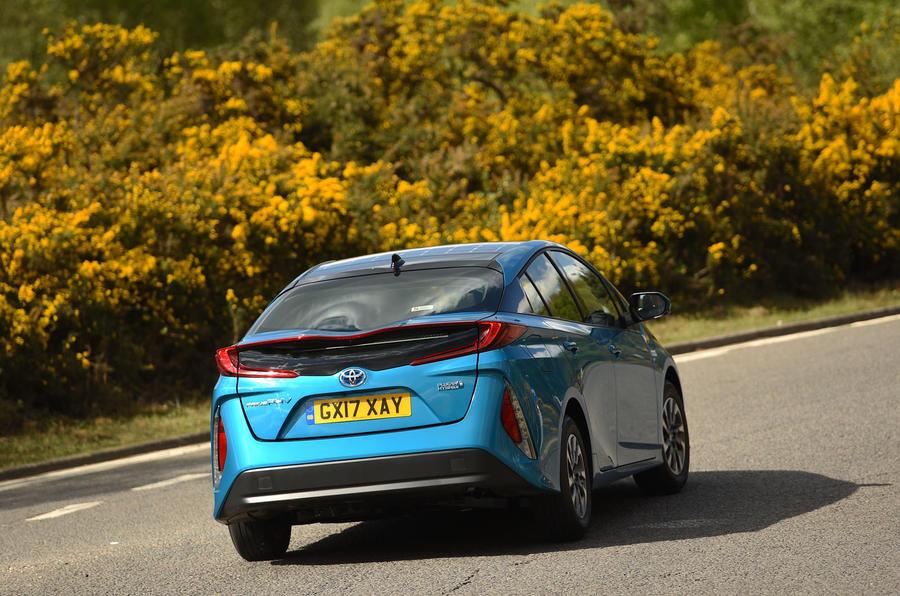Your support helps us to tell the story
From reproductive rights to climate change to Big Tech, The Independent is on the ground when the story is developing. Whether it's investigating the financials of Elon Musk's pro-Trump PAC or producing our latest documentary, 'The A Word', which shines a light on the American women fighting for reproductive rights, we know how important it is to parse out the facts from the messaging.
At such a critical moment in US history, we need reporters on the ground. Your donation allows us to keep sending journalists to speak to both sides of the story.
The Independent is trusted by Americans across the entire political spectrum. And unlike many other quality news outlets, we choose not to lock Americans out of our reporting and analysis with paywalls. We believe quality journalism should be available to everyone, paid for by those who can afford it.
Your support makes all the difference.We Brits like the Toyota Prius hybrid, but we’ve never really warmed to its plug-in hybrid sister car. Despite buying loads of plug-in Mitsubishi Outlander PHEVs and VW Golf GTEs, Prius Plug-in sales have always been decidedly meagre. This is a surprise: after all, isn’t it simply making the popular Prius even more usable?
It’s now take two time for Toyota. This time, the rechargeable Prius has a longer claimed electric range, and all the enhancements enjoyed by the regular, transformed Prius. It also originally had a daft list price, until Toyota GB sensibly read the early press reviews and sheepishly cut £3200 off it. But still, even with the £2500 government plug-in car grant, it still starts at over £29,000 – a full £6000 more than a regular Prius. Is it justifiable?
The secret of any good plug-in is offering a decent EV experience combined with a lengthier petrol-assisted driving range when outside town. Here, the Plug-in isn’t bad: it’s no class-leader, but drives well enough. Sadly, the EV satisfaction doesn’t last long: its 8.8kWh battery realistically only gives 25 miles per full charge before the engine kicks in.

What’s more, although the official figures suggest 283mpg is attainable, this is, of course, nonsense. Realistically, you’ll be getting high-60s economy. Or, in other words, not much more than the regular Prius. The tax benefit is more clear-cut, luckily: CO2 emissions of 22g/km will be music to the ears of company car drivers.
Guess what? To drive, it’s rather like a normal Prius. Unremarkable. Accelerate hard and the engine will roar, but it’s otherwise refined enough, although it’s not particularly quick. The transition between EV and petrol power is commendably seamless, and reasonably well-controlled body roll makes cornering a competent if rather dull experience.
The Prius Plug-in does ride well, though – here, it’s a big improvement over the old one. More expensive rear suspension and a lower centre of gravity has a worthwhile effect, particularly in town. It can, however, float a bit over crests, and some of the worst bumps will cause the body to shudder.

You’ll notice a knock-on effect of the plug-in tech in the boot. It has a bigger battery than the hybrid, so the boot is considerably smaller. You also only get two seats rather than three. This entry-level Business Edition model is well equipped though, with sat nav, DAB, Bluetooth, head-up display and auto headlights. You can get a £1500 solar roof, too, that Toyota says can add up to three miles a day in battery range. Perhaps not in cloudy old Britain, though…
Toyota is realistic. Only 1 in 10 UK Prius sales will be of this Plug-in model. It’s still of niche appeal despite its improvements. As before, you’re better off saving your money and going for the regular, more practical, almost as economical Prius. And if you really must have a plug-in, the Volkswagen Golf GTE is a much better all-rounder that sells for surprisingly similar cash.
Toyota Prius Plug-in Business Edition Plus
Price £29,195 (including £2500 gov't grant)
Engine 4 cyls in line, 1798cc, petrol, plus dual-motor hybrid assist
Power 121bhp at 5200rpm
Torque 105lb ft
Gearbox e-CVT
Claimed electric range 39 miles
Kerb weight 1550kg
0-62mph 11.1sec
Top speed 101mph
Economy 283mpg (combined)
CO2/tax band 22g/km, 9%
Rob Adams is a writer for AutoCar.
Join our commenting forum
Join thought-provoking conversations, follow other Independent readers and see their replies
Comments